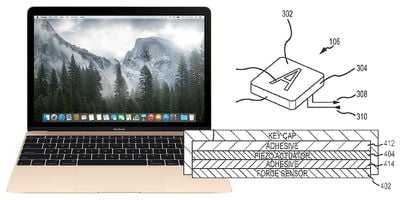Apple Patents Switch-Less Force Touch Keyboard, Could Lead to Thinner Macs
The U.S. Patent and Trademark Office on Tuesday granted Apple a patent for a low-travel keyboard design with Force Touch-like sensors that measure the pressure placed on a key when a user presses or rests a finger on it.

As summarized by AppleInsider, the exhaustive patent filing details how the keyboard would have a switch-less QWERTY input mechanism, rather than mechanical switches, allowing for less key travel and potentially thinner Mac keyboards.
Apple's current MacBook and Mac accessory lineups employ modified scissor switches, or butterfly switches on the 12-inch Retina MacBook, nestled within hollow key caps. Today's patent mirrors the aesthetic of existing designs, but deviates from established technology by replacing mechanical switches for a stack of sensors, actuators and supporting circuitry.
Theoretically the system operates akin to Apple's Force Touch trackpads, but on a much larger scale; one force sensor package for each keyboard key. Force sensors configured to measure downward pressure are integrated beneath the keyboard's key caps, while integrated actuators — part of the key stack — generate haptic feedback.
The patent filing does not guarantee that Apple will release a Force Touch keyboard, but a pressure-sensitive keyboard is plausible alongside the Magic Trackpad and Force Touch trackpads on MacBooks.
Apple's new Retina MacBook has been criticized by some over its all-new butterfly mechanism keyboard, which has low key travel, so whether Apple implements this new keyboard design into the rest of its MacBook lineup remains to be seen.
Apple was granted U.S. Patent No. 9,178,509, and credits Jeffrey T. Bernstein as its inventor.
Popular Stories
While the iPhone 17 Pro and iPhone 17 Pro Max are not expected to launch until September, there are already plenty of rumors about the devices.
Below, we recap key changes rumored for the iPhone 17 Pro models as of April 2025:
Aluminum frame: iPhone 17 Pro models are rumored to have an aluminum frame, whereas the iPhone 15 Pro and iPhone 16 Pro models have a titanium frame, and the iPhone ...
Apple is preparing a "bold" new iPhone Pro model for the iPhone's 20th anniversary in 2027, according to Bloomberg's Mark Gurman. As part of what's being described as a "major shake-up," Apple is said to be developing a design that makes more extensive use of glass – and this could point directly to the display itself.
Here's the case for Apple releasing a truly all-screen iPhone with no...
The first iOS 19 beta is less than two months away, and there are already a handful of new features that are expected with the update.
Apple should release the first iOS 19 beta to developers immediately following the WWDC 2025 keynote, which is scheduled for Monday, June 9. Following beta testing, the update should be released to the general public in September.
Below, we recap the key...
If you have been experiencing issues with wireless CarPlay in your vehicle lately, it was likely due to a software bug that has now been fixed.
Apple released iOS 18.4.1 today, and the update's release notes say it "addresses a rare issue that prevents wireless CarPlay connection in certain vehicles."
If wireless CarPlay was acting up for you, updating your iPhone to iOS 18.4.1 should...
Apple may have updated several iPads and Macs late last year and early this year, but there are still multiple new devices that we're looking forward to seeing in 2025. Most will come in September or October, but there could be a few surprises before then.
We've rounded up a list of everything that we're still waiting to see from Apple in 2025.
iPhone 17, 17 Air, and 17 Pro - We get...
Apple's upcoming foldable iPhone (or "iPhone Fold") will feature two screens as part of its book-style design, and a Chinese leaker claims to know the resolutions for both of them.
According to the Weibo-based account Digital Chat Station, the inner display, which is approximately 7.76 inches, will use a 2,713 x 1,920 resolution and feature "under-screen camera technology." Meanwhile, the...
Apple's iPhone development roadmap runs several years into the future and the company is continually working with suppliers on several successive iPhone models simultaneously, which is why we often get rumored features months ahead of launch. The iPhone 17 series is no different, and we already have a good idea of what to expect from Apple's 2025 smartphone lineup.
If you skipped the iPhone...
Apple today released iOS 18.4.1 and iPadOS 18.4.1, minor updates to the iOS 18 and iPadOS 18 operating systems that came out last September. iOS 18.4.1 and iPadOS 18.4.1 come two weeks after the launch of iOS 18.4 and iPadOS 18.4.
The new software can be downloaded on eligible iPhones and iPads over-the-air by going to Settings > General > Software Update.
There have been complaints about ...
Apple has confirmed that it will be permanently closing its retail store in the heart of Bristol, England, and there is no replacement in sight.
Apple Bristol in 2023
Apple Bristol will be closing its doors on Saturday, August 9, due to redevelopment plans at the Cabot Circus Shopping Centre, and the adjacent Bristol Shopping Quarter. According to news reports, and a building application, the ...












 ('https://upload.wikimedia.org/wikipedia/commons/7/7f/Atari_400_keyboard.jpg')
('https://upload.wikimedia.org/wikipedia/commons/7/7f/Atari_400_keyboard.jpg')












